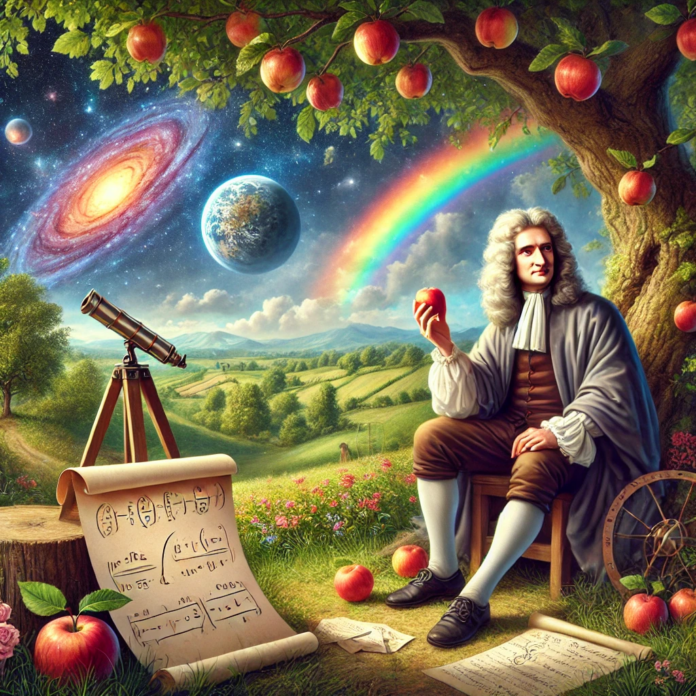On January 4, 1643 (December 25, 1642, Old Style), in Woolsthorpe, Lincolnshire, England, Isaac Newton was born. Widely regarded as one of the greatest scientists in history, Newton’s groundbreaking work in mathematics, physics, and astronomy laid the foundation for modern science. His laws of motion and universal gravitation revolutionized our understanding of the natural world, while his contributions to calculus and optics continue to shape scientific thought.
A Humble Beginning
Newton was born prematurely and into a farming family. His father passed away before his birth, and his mother remarried, leaving Newton to be raised by his grandmother. Despite these early challenges, Newton showed remarkable curiosity and intellect, eventually attending the University of Cambridge in 1661.
The Plague Years and Breakthrough Discoveries
In 1665, when the Great Plague forced Cambridge to close, Newton returned to his family home in Woolsthorpe. During this time, he made some of his most significant discoveries, including:
• The Laws of Motion: Defining the principles of inertia, acceleration, and action-reaction forces.
• Universal Gravitation: The realization that the same force governing the fall of an apple also governs the motion of celestial bodies.
• Optics: Experiments demonstrating that white light is composed of a spectrum of colors.
• Calculus: Independently developing the mathematical framework that underpins much of modern science and engineering.
These years, often referred to as his “annus mirabilis” (miraculous year), marked a turning point in scientific history.
The Principia and Universal Gravitation
In 1687, Newton published Philosophiæ Naturalis Principia Mathematica (The Mathematical Principles of Natural Philosophy), one of the most influential works in scientific history. The Principia presented his three laws of motion and the law of universal gravitation, uniting terrestrial and celestial mechanics under a single framework.
His famous story of an apple falling from a tree, whether apocryphal or not, symbolizes his insight into the nature of gravity.
A Legacy of Innovation
Newton’s contributions extended beyond physics:
• Optics: He built the first reflecting telescope, significantly improving the quality of astronomical observation.
• Alchemy and Theology: Newton devoted much of his later life to alchemical studies and theological writings, seeking deeper truths about the universe.
• Mathematics: His work on calculus, independently developed alongside Leibniz, became a cornerstone of modern mathematics.
A Public Life and Later Years
In 1696, Newton became Warden of the Royal Mint, where he reformed England’s currency and fought against counterfeiting. In 1703, he was elected President of the Royal Society, a position he held until his death.
Despite personal challenges, including disputes with other scientists like Leibniz, Newton remained a towering figure in science and society.
Newton passed away on March 20, 1727, and was buried with great honor in Westminster Abbey.
Legacy and Influence
Isaac Newton’s work transformed our understanding of the universe and set the stage for the Scientific Revolution. His discoveries continue to inspire generations of scientists, engineers, and thinkers, making him a central figure in the history of human knowledge.
Isaac Newton: The Genius Who Defined the Universe
Newton’s brilliance and relentless pursuit of truth changed the course of history. His laws of motion and universal gravitation remain fundamental to science, and his legacy exemplifies the power of reason and inquiry.
As Newton humbly said: “If I have seen further, it is by standing on the shoulders of giants.” Yet his own genius ensures that he remains one of the greatest giants in the history of science.




